5 Tips To Shop Online Safely This Holiday Season
Ever since Windows Defender was released (which includes Windows Defender Browser Protection on Macs as well), a lot of people have decided that they don’t need any other virus protection at all.
That’s quite a big risk to take.
Here are 5 tips to protect your computer or laptop from viruses while shopping this holiday season.
Tip 1: Don’t just rely on Windows Defender.
Windows Defender is good at what it does, but it has its own issues. Dedicated anti-virus software is ideal because the best ones have decades of virus-fighting

experience behind them.
And remember: It’s not just viruses we need to protect against nowadays.
At the absolute minimum, you should have anti-virus and anti-malware programs installed. Anti-malware software will protect you from exploits in your software (including Windows Defender!), such as ‘backdoors’ – lines of code written by inept or unethical coders which allow hackers to observe – and sometimes manipulate – your computer.
I’ve used the confusingly-named ‘Malwarebytes’ for years as my anti-malware protection, but all that matters is t
hat you choose and install one of them.
But always, always, always research new software before you put it on your computer. This includes security software – especially if you’re new to the whole ‘protecting my computer’ thing.
Tip 2: Keep your security software updated.
It’s very easy to think something like ‘Bah! I don’t have time to sit around waiting for my security software to update and then reset my computer’.
What’s more annoying, though: Waiting for your computer to update and restart, or losing all of your information because your computer refuses to even start at all? Because that’s the kind of thing you’re risking. The best times to check for updates are when you start using your computer for the day, or when you’ve finished using it for the day.
Just make sure you put aside some time for security program maintenance, whenever it is. In any case, check out your ‘update’ setting in your security software and set it to an appropriate routine for you.
Tip 3: Don’t just rely on software to keep you safe.
Your security software can’t protect you against giving personal info to a false friend account on Facebook (i.e. it’s not actually them, but a fake account with their name). Incidentally, this usually happens because that particular friend didn’t have security software or didn’t take updating the software seriously.
Further, don’t go to ‘those’ internet sites (you know the ones) without security software.
Finally, don’t open an email attachment unless they’re from a trusted source. Actually, that deserves its own section.
Tip 4: Don’t get phished.
Phishing is when someone tries to steal your data by pretending to be a person or company that you already trust. For instance, you might get an email which
says ‘Your bank account is in danger of being closed, contact us with your details to make sure we have the right information.’
For legal reasons, a business will NEVER ask for your details in an email.
This is especially important for online shoppers to keep in mind. The person you’re buying things off of on eBay (or wherever) – how’s their software security? That email you just got might not actually be from them!
Now let’s imagine you get an email from a friend titled ‘Look what I just bought!’ or something similar. You open the attached picture and nothing happens. But something did happen – because that wasn’t a picture you clicked on. It was a program, and that program is now collecting all of your data and sending it off to nefarious types to do with as they please.
Examining the email again, you realize it wasn’t even your friend’s email address – if only you’d checked that first! And just so you know – this also goes for attachments in text messages and online chat.
If you receive a message/email like this, don’t delete it – forward it to your communications provider so they can learn from it.
Tip 5 : Use all of this information to shop safely this holiday shopping season.
It’s easy to be terrified about all of this, especially for the older generations who didn’t grow up around computers. Sure, there are devious people out there trying to get your information (or just trying to make you have a bad time) but that’s nothing new.
As stated earlier, a lot of anti-virus software has been around for decades and the anti-virus developers are aware of all the little tricks that the bad guys use.
Viruses might be part of everyday life now – but so is anti-virus software. Remember, it’s better to laugh at how paranoid you are than it is to cry about how lax your security was. But more importantly: Now that you know all of this you can shop online safely and confidently this holiday season.
Happy Holidays!
